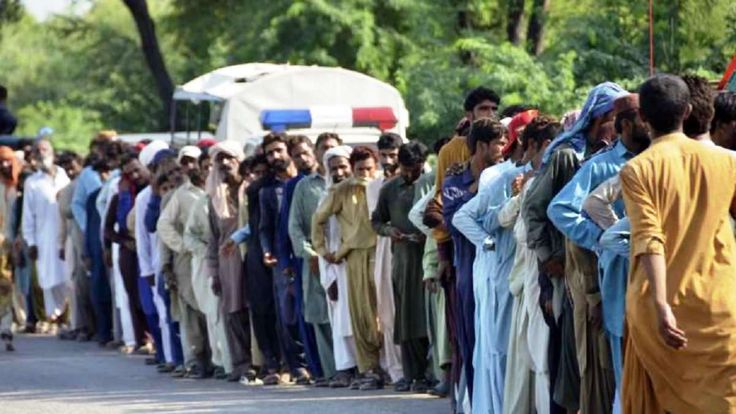Afghan refugees in Pakistan are rushing to return to Afghanistan as the November 1 deadline set by Pakistan for undocumented migrants to leave the country approaches. For many of these refugees, who have lived in Pakistan for years and even decades, the impending expulsion threatens to tear families apart and thrust them into an uncertain future under the Taliban government in Afghanistan.
The Taliban government in Afghanistan has reported that approximately 60,000 Afghan nationals returned to Afghanistan between September 23 and October 22 in response to Pakistan’s announcement that it would expel undocumented migrants who do not leave. This figure represents a significant increase in daily returns, with recent data indicating that returnee numbers are three times higher than usual, according to the Taliban refugee ministry.
The affected region, particularly near Karachi’s Sohrab Goth area, one of Pakistan’s largest Afghan settlements, has witnessed a surge in departures. Bus service operators have increased their services to accommodate the exodus, as lines of departing refugees form nearby. The sense of urgency is palpable, with many Afghan families forced to leave their homes and lives behind in Pakistan.
In interviews with seven refugee families in Sohrab Goth, as well as officials, community leaders, aid workers, and advocates, it becomes clear that Islamabad’s expulsion threat, coupled with escalating state-backed harassment, has had a profound impact on Afghan refugees, pushing even those with valid papers to leave.
While the Pakistani Interior Ministry did not respond to immediate requests for comment, the Foreign Ministry issued a statement claiming that the expulsion plan aligns with international norms and principles. They also pointed to Pakistan’s history of hosting Afghan refugees over the past four decades.
Pakistan is home to over four million Afghan migrants and refugees, with an estimated 1.7 million being undocumented, according to Pakistani authorities. Afghans constitute a significant portion of migrants in the country, with many arriving after the Taliban’s resurgence in 2021, although a substantial number have been present since the 1979 Soviet invasion.
Pakistan’s decision to expel undocumented migrants came in the wake of suicide bombings earlier in the year, which the government linked to Afghans without providing concrete evidence. Islamabad has also accused Afghan refugees of involvement in smuggling and militant activities. Additionally, Pakistan, grappling with severe inflation and an International Monetary Fund bailout program, cited the financial burden of hosting undocumented migrants as a reason for the expulsion.
The impending crisis has plunged Afghan migrants into a state of fear and desperation. For many of them, Pakistan is not just a place of refuge; it is the only home they know, offering respite from the economic hardships and social conservatism prevalent in Afghanistan. Samar Abbas of the Sindh Human Rights Defenders Network, which is assisting 200 Afghans seeking to remain in Pakistan, emphasized the stark challenges faced by these migrants.
In early September, an average of 300 individuals crossed the border into Afghanistan daily, according to international organizations working on migration issues. However, following Pakistan’s announcement of the November deadline, this number surged to around 4,000, highlighting the gravity of the situation.
To address the crisis, Balochistan province, which borders Afghanistan, is opening three additional border crossings, according to the information minister for the province. The Pakistani government has also intensified its messaging on the impending deadline, with state-run television displaying countdowns to November 1.
Federal Interior Minister Sarfaraz Bugti has warned that law enforcement agencies will begin removing “illegal immigrants who have… no justification” for remaining in Pakistan. These individuals will be processed at “holding centers” before deportation, with assurances that women, children, and the elderly will be treated respectfully. However, the duration of their detention in these centers remains uncertain.
Additionally, Bugti cautioned that Pakistani citizens aiding undocumented migrants in obtaining false identities or employment will face legal action. The situation post-November 1 is expected to be chaotic, with concerns about the conditions in Afghan refugee camps.
The United Nations refugee agency UNHCR and the International Organization for Migration (IOM) have expressed concern about the “serious protection risks” faced by women and girls forced to return to Afghanistan. With limited employment opportunities for women in Afghanistan, the restrictions have led to decreased job opportunities for female NGO workers.
While Pakistan has stated that it will not target Afghans with legal status, many migrants with proper documentation have reported being subjected to harassment. UNHCR data reveals that as of October 18, 2023, 14,700 documented Afghans had left Pakistan, more than double the 6,039 in the previous year. Most of these returning Afghans cited fear of arrest in Pakistan as their reason for departure.
There are over 2.2 million Afghan migrants in Pakistan with some form of government-recognized documentation conveying temporary residence rights. Among them, approximately 1.4 million hold Proof of Registration (PoR) cards, which expired on June 30. Despite Islamabad’s claim that it will not take action against those with invalid cards, reports indicate that police harassment has increased since the expulsion threat.
More than a dozen migrants confirmed this account, while Taliban diplomats in Pakistan echoed these concerns. Karachi East Police Superintendent Uzair Ahmed downplayed the harassment as non-systemic, asserting that offenders would be investigated.
For many Afghans with legal status, the fear of being separated from family members without documentation is a compelling reason to leave. The looming deadline has forced families like Hajira, a 42-year-old widow in Sohrab Goth, to contemplate leaving with their sons and grandchildren to avoid separation.
Muhammad, an 18-year-old, succinctly summarized the sentiment among many refugees, emphasizing their years of residence in Pakistan and the uncertainty of their return to Afghanistan. The impending crisis has left these Afghan refugees in a precarious and challenging situation, with an uncertain future as they return to a country grappling with its own set of difficulties.














